Eastern Europe’s Coming-Out Party
Ukraine and Poland had to overcome great prejudice and skepticism to pull off the Euro 2012 soccer tournament.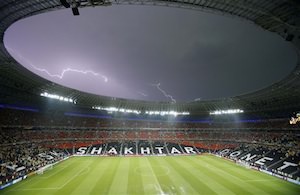
KIEV, Ukraine — Rarely have the organizers of a large sports event received as much scrutiny as Ukraine and Poland did ahead of the Euro 2012 soccer tournament, which ended last week. Corruption, racist fans, police arbitrariness, violence, chaos and sheer incompetence were only some of the fears that the Western media, particularly in Britain, fanned consistently. Now that the games have drawn to a close, most fans and officials are looking back on a well-organized and overwhelmingly peaceful event, one that would not have proceeded any more smoothly had it been held in Western Europe.
Construction delays and political turmoil had led international observers to doubt the suitability of Ukraine as co-host of the games. Visitors to its capital Kiev, however, found themselves in a friendly host city with a well-functioning public transportation system and many interesting museums and monuments. Compared with my last visit five years ago, I found a city that had renovated its fin de siècle buildings in the municipal center, bought a whole fleet of modern buses for public transportation and built a palace to soccer — the beautiful new Olympic Stadium. Furthermore, the central Khreshchatyk Boulevard, normally traversed by tens of thousands of cars, became a big vehicle-free area for pedestrians and fans.
Not everyone in Kiev was overjoyed about this. Larissa Petrovna, who has lived here for four decades and does not like soccer, complained that Kiev’s residents had to spend hours in traffic jams trying to get to work and endure rude fans. The presence of UEFA, soccer’s European governing body, in the city was indeed overwhelming. A large, heavily guarded fan zone took up all of Independence Square and most of Khreshchatyk. Here, UEFA set the rules: No entrance before noon and no drinks allowed that were not provided by Carlsberg or Coca-Cola, the tournament’s official sponsors.
My friend Stefan Renner, a longtime soccer fan from Switzerland and critical observer of developments in the sport, disliked the fan zone: “I found it sterile and thoroughly commercialized. UEFA appropriates public space and subjects it to the rule of private corporations.” Others criticized the fact that UEFA, a nonprofit organization that pays no taxes, pockets billions in profits from tournaments like the Euro 2012 but takes no responsibility for the costs that the organizers have to bear. The many Swedish and British fans, dressed in their national colors, with their faces painted and beers in their hands, didn’t seem concerned with such political questions, however, as they enjoyed their peaceful soccer party.
Politics were nonetheless surprisingly present in the city center. Supporters of former Prime Minister Yulia Tymoshenko, who has been in prison for almost a year as a result of an overtly politicized court trial, set up a tent city next to the fan zone. On stands with pictures of Tymoshenko, they accused Ukrainian President Viktor Yanukovich of authoritarianism and corruption and quoted Western statesmen’s condemnations of the trial. Many European heads of state canceled their trips to Ukraine to support their teams because of the trial. The government’s decision to leave the tent city throughout the tournament did much to weaken international criticism of Yanukovich’s increasingly authoritarian regime.
Another political issue that stayed very much at the forefront of international and Ukrainian press coverage in Ukraine was allegations of corruption linked to the tournament. Ukraine is one of the most corrupt countries in the world, occupying the 152nd place on Transparency International’s Corruption Perceptions Index of 183 nations in 2011. Ukraine’s investments for Euro 2012 were gigantic, particularly for a country that has verged on the edge of bankruptcy since the international financial crisis of 2009. Expenses ranged from $5 to $10 billion and were paid for almost entirely by the state, after original plans for a wide-ranging public-private partnership did not materialize. The first is the official number, the second is the sum quoted by Ostap Semerak, an opposition member of Ukraine’s parliament. He claims that state officials embezzled as much as $4 billion, an accusation that has led members of the European Parliament to demand an official investigation by UEFA. One example Semerak cites is the large cost for Kiev’s Olympic Stadium — estimated at almost $600 million and much higher than for comparable venues in Poland and Germany.
Volodymyr Artiukh, head of the general contractor for the stadium, AK Engineering, admitted in court June 6 that he helped embezzle $3 million intended for the venue’s modern vacuum toilet system imported from Germany. Independent Ukrainian journalists have linked various contractors to figures close to Yanukovich’s governing Party of Regions. Legal proof does not exist so far, as the companies’ true owners remain shrouded in mystery due to opaque offshore firms and the lack of will for a thorough investigation. What is clear, though, is that the process of awarding construction contracts was not transparent, starting with the Ukrainian government’s decision in 2010 to cancel all competitive bidding for Euro 2012 projects.Nevertheless, the new roads, high speed trains, airports and stadiums were all ready for the European soccer championship, and tourists experienced very few transportation or housing problems during their stay. In Kiev, Lviv and Kharkiv, the organizers established well-functioning tent cities for tens of thousands of Swedish, Danish, German and Dutch fans. In Donetsk, the situation was slightly more problematic, and the local authorities were forced to house some fans in schools and stadiums. These complications were perhaps one reason why many seats stayed empty during the games there.
The feared violence also did not materialize. With the exception of clashes between Russian and Polish soccer hooligans before and after the game between the two rivals and racist chants by Russian and Spanish fans in Poland, no major incidents were reported. Some inhabitants of Kiev reported some unpleasant encounters with inebriated British fans, and we witnessed British attempts to rush the pitch during the Sweden-England games, which the security guards stopped resolutely by throwing the fans back into the ranks head first. These kind of isolated incidents were nothing extraordinary for a European Cup.
Most foreigners experienced Ukrainians as open-minded, hospitable and helpful. The Ukrainian magazine Korrespondent wrote that since 77 percent of Ukrainians have never been abroad, for financial reason and the overwhelming difficulty of receiving a visa for Western countries, the European Cup was “their own window to the world” for many. Thousands of young Kievans acted as volunteers in the city center to distribute guidebooks and answer foreigners’ questions. Many of them, however, stood idly because the city had already done a very good job of distributing English language signs in the metro and on maps in central places.
The question that remains, then, is the extent to which the Euro 2012 will benefit Ukraine in the long term. Korrespondent claims that Ukraine’s development leaped ahead by 30 years, perhaps an overoptimistic assessment. The investments could also prove to become a major burden. The International Monetary Fund had to rescue Ukraine in 2009 with a $15.6 billion bailout, but much of this money is currently blocked because of disagreements over the reform process in the country. Nonetheless, the government is considering applying for more IMF money in 2013. The economy remains vulnerable to external shocks, and international investors hesitate to commit to the country because of its unstable political and economic situation.
The Euro 2012 at least gave Ukraine an economic boost this year. London-based consultancy Capital Economics expects positive effects of up to 0.8 percent of GDP. In the city of Lviv, for example, fans spent almost $40 million during the group stage phase of the tournament. On June 17 alone, 330,000 foreigners entered the country ahead of the decisive games of the group stage, according to the border control. And in Kiev’s fan zone, the 1.25 million supporters who were present for the group phase drank 200,000 liters of beer and ate 5 miles of sausages.
In spite of these impressive numbers, one has to ask whether investment in expensive stadiums, the long-term usefulness of which remains unclear, is really the most effective path to economic development for a poor nation like Ukraine. Moreover, it will remain to be seen whether the number of tourists in Ukraine will really grow in the future and render the many expensive new airport terminals and hotels profitable.
Beyond dispute is the fact that Euro 2012 considerably improved Ukraine’s image in the world, as many people traveled to the country who never would have done so were they not attending the tournament. This encounter contributed to easing some of the stereotypes that still exist on both sides of the former iron curtain. Many Ukrainians I spoke to also felt a sense of pride in their battered country. As Igor, the taxi driver who brought us to the airport, said: “We Ukrainians proved to the world that we could pull this off.”
Your support matters…Independent journalism is under threat and overshadowed by heavily funded mainstream media.
You can help level the playing field. Become a member.
Your tax-deductible contribution keeps us digging beneath the headlines to give you thought-provoking, investigative reporting and analysis that unearths what's really happening- without compromise.
Give today to support our courageous, independent journalists.
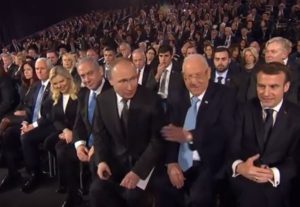
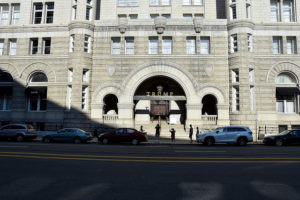
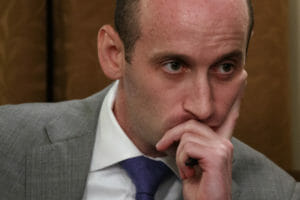
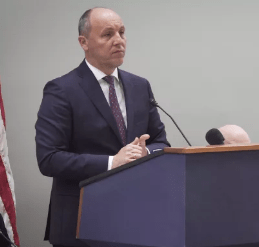
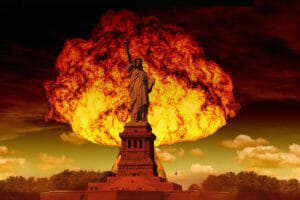
You need to be a supporter to comment.
There are currently no responses to this article.
Be the first to respond.